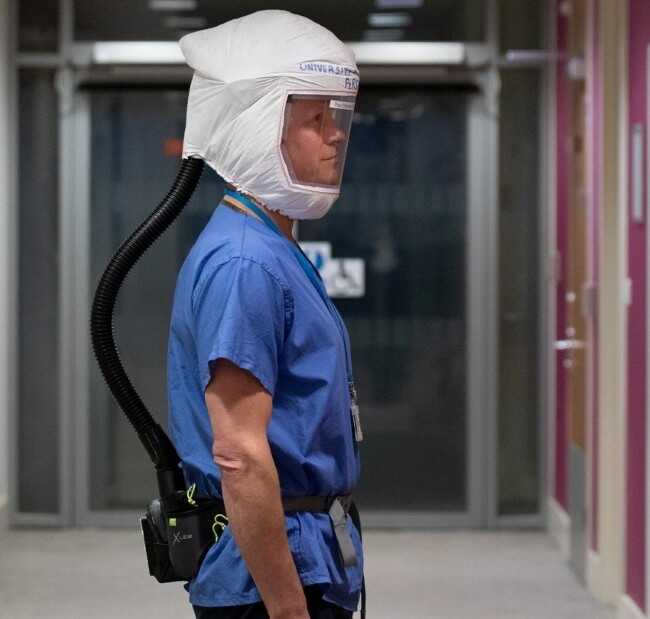3D Printed and Laser Cut Respirator Designed for COVID-19
01-05-2020 | By Rob Coppinger
Laser cutting and 3D printing have been used to make a personal respirator that could be used worldwide to protect doctors and nurses tackling the COVID-19 pandemic.
At the beginning of April, frontline healthcare staff in the UK were testing the prototype respirator called PeRSo on their ward. The personal respirator comes as a small portable unit. It consists of a fabric hood for the wearer's head, a plastic visor to protect their face, a belt-mounted electric fan pack and a High Efficiency Particulate Air (HEPA) filter which delivers clean air into the hood. Electronics and computer science researchers at the University of Southampton helped develop the personal respirator with the aid of engineers, medical staff and industry partners.

Personal respirator created by University of Southampton to protect frontline NHS staff
Image Credit: Ric Gillams
“The engineering team have rapidly developed something simple yet effective. The HEPA filtered air removes 99.95% of particulate matter, and the face mask protects from splashes, and so we think this will reduce the risk of infection,” said Paul Elkington, a co-director of the PeRSo project work. He is a professor of respiratory medicine at the University of Southampton. He added: "We must minimise the risk of infection for medical staff and stop them getting sick so that they can care for others.”
PeRSo Open Source Publishing
The design plans and manufacturing instructions for the PeRSo are being published in an open-source manner. This will make the technology available around the world for anyone that wishes to make it. The PeRSo’s developers are also working to obtain the necessary safety certifications to ensure the respirator can be used by medical staff anywhere. The PeRSo has been designed to be lightweight and comfortable so it can be worn continuously for up to nine hours. The fan and its electronic control unit have been made to be located on a belt to ensure it is operating far from the user's head to avoid the distraction of fan noise.
The University of Southampton’s PeRSo industry partners include the high technology company known for its Formula One racing work, McLaren, the yacht sail maker Kemp Sails and INDO, a lighting brand of Southampton engineering company Baynhams. Hywel Morgan, a professor of bioelectronics in electronics and computer science at the University, said: “This is an excellent example of industry, universities and hospitals combining their expertise and answering the call to develop solutions needed to save lives in the current crisis.”
Baynhams, which also has a brewery band, is offering the PeRSo to potential customers. To make the PeRSo a more accessible design for the companies in other countries that want to make it, it has been designed with off-the-shelf components; materials that will be readily available in other regions, and the manufacturing process can use simple sewing machines. Further work is being done by the PeRSo team’s engineers to design simpler versions using only components available in developing countries.
